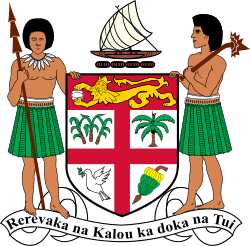Removal of Ratu Mara, 2000
 |
| This article is part of a series on the politics and government of Fiji |
|
Legislative
|
|
Judiciary |
|
Part of a series on the |
|---|
| History of Fiji |
 |
| Early history |
| Modern history |
| Coup of 2000 |
| Proposed Reconciliation Commission |
| Crisis of 2005–06 |
| Coup of 2006 |
On May 21, 2003, the Police Investigations Department confirmed that they had opened an investigation into the resignation of the Fiji's former President, Ratu Sir Kamisese Mara. Mara resigned under duress on May 29, 2000, and handed power over to Commodore Frank Bainimarama. In what policians have called a "coup within a coup," Ratu Mara was whisked away on a warship on May 28, where he was allegedly approached by a group of present and former military and police officers who ordered him to suspend the Constitution. When he refused, ("If the Constitution goes, I go," he defiantly declared) the group, including Bainimarama, former Prime Minister and 1987 Coup Leader Sitiveni Rabuka, former military commander Ratu Epeli Ganilau (a son-in-law of Mara's), and former Police Commissioner Isikia Savua, are said to have forced Mara's resignation. He was subsequently taken to his home island in the Lau Islands.
Mahendra Chaudhry, the deposed Prime Minister, has publicly supported Mara's version of events, and has further alleged that Mara was blackmailed with a threat to kill his daughter, Adi Koila Mara Nailatikau, who was one of the hostages. Another of Mara's daughters, Adi Ateca Ganilau, however, has said that her father involuntarily chose to resign rather than give in to the demands of the military that he abrogate the constitution, and that he was later offered reinstatement but refused it because he was upset that the constitution had been overturned. Commodore Bainimarama has defended his role in the incident saying Ratu Mara was "an old fool" and his removal was "necessary" at the time. Chaudhry, for his part, has claimed that Ilisoni Ligairi, Speight's security chief, told him that Savua and former Prime Minister Rabuka were involved in the planning of the coup. "Ligairi can't lie as he was very much involved and is now awaiting trial at Nukulau Island," Chaudhry said.[1]
The military regime that took over appointed the current President, Ratu Josefa Iloilo. After the coup had been quashed, the High Court ruled on 15 October 2000 that Mara's replacement was unconstitutional and ordered his reinstatement, but Mara decided to spare the country further constitutional trauma by resigning officially, with his resignation retroactive to May 29, 2000.
Police declared in 2003 that they were facing "many challenges" in their investigation, finding many officers uncooperative. Then on 30 April 2004, Police spokesman Mesake Koroi, said that a lot of "hearsay and rumours" were going around that would not stand up in court. Many witnesses were refusing to talk. "Unfortunately we are hitting a brick wall in our investigations at the moment," Koroi said. Commissioner Hughes revealed on 5 January 2006 that this investigation was legally complex and was being hampered by the lack of cooperation of various witnesses.
References
- ↑ "Ligairi told us: Chaudhry". The Daily Post (archived). Fiji. 30 April 2001. Archived from the original on February 29, 2008. Retrieved 30 August 2013.